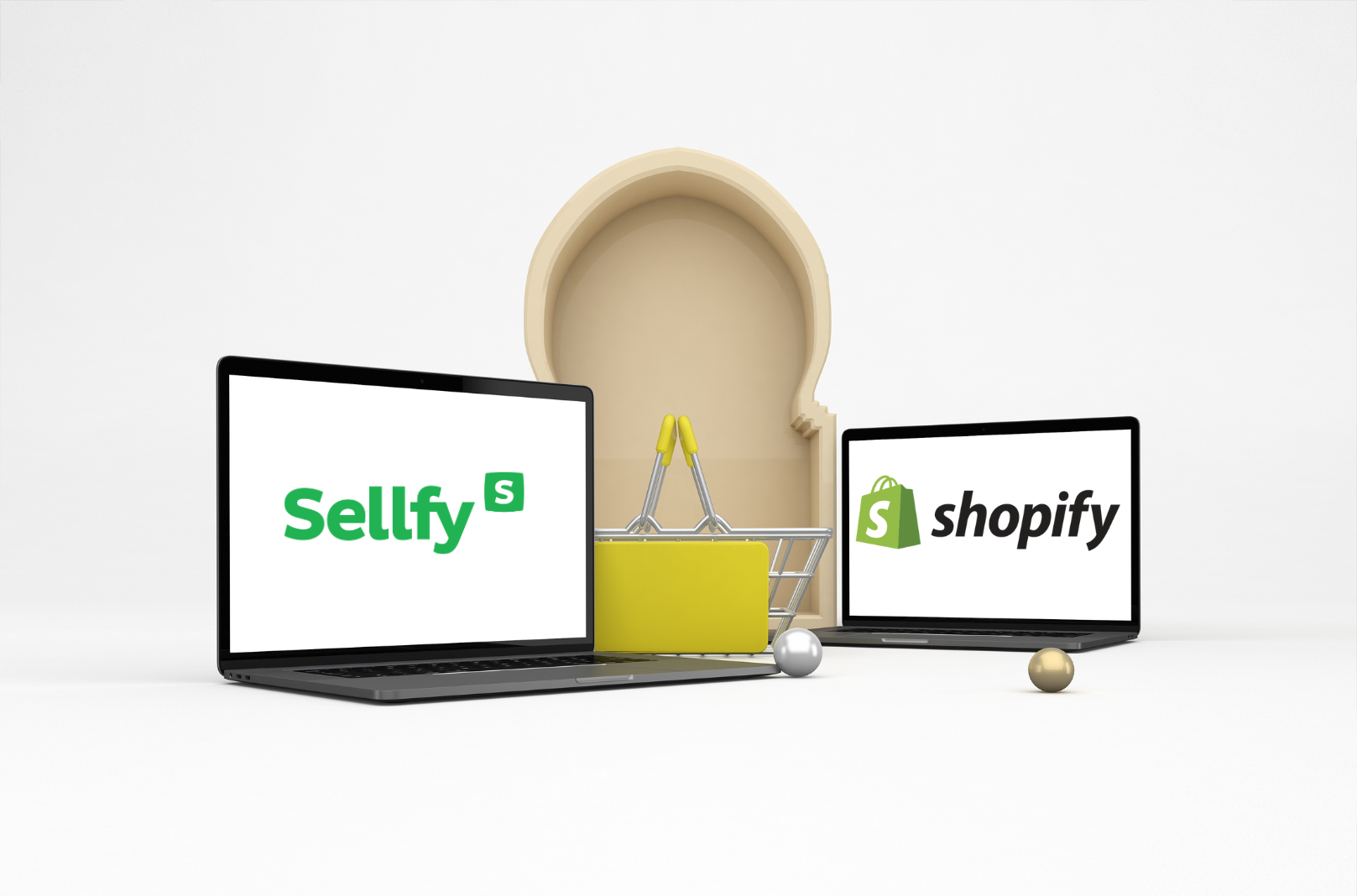
Selecting the right platform for your online business is essential to choosing the foundation for your digital storefront. Two prominent contenders in this space, Sellfy vs Shopify, offer distinct approaches tailored to diverse business models and aspirations. As we dissect the strengths and weaknesses of Sellfy and Shopify, we aim to guide you toward a well-informed decision, ensuring your chosen platform meeting all the unique requirements of your online enterprise.

Sellfy is an ideal eCommerce platform designed for digital product creators. It allows individuals to sell digital goods such as ebooks, music, videos, and more directly to their audience. Sellfy provides customization, marketing, and payment processing tools to help creators monetize their digital content easily.

Shopify is a comprehensive eCommerce platform for many businesses, including small startups, medium-sized businesses, and large enterprises. It enables users to create and manage their online stores, even selling physical or digital products. Shopify offers a range of features, including customizable storefronts, secure payment processing, inventory management, and various third-party integrations for a complete eCommerce solution.
Two prominent players in the field, Sellfy and Shopify, offer distinct features catering to different business models and preferences. Let's delve deep into various aspects to understand the strengths and weaknesses of each platform.
Sellfy specializes in catering to digital product creators. The platform offers a user-friendly experience with a focus on simplicity. It provides tools for instant delivery of digital goods, customizable storefronts, and seamless integration with social media for direct selling. Sellfy's strength lies in its ability to streamline the selling process for digital products, making it an attractive choice for artists, writers, and creators.
Shopify, on the other hand, is a versatile eCommerce powerhouse suitable for a wide range of businesses, from small startups to large enterprises. Its eCommerce features are extensive, covering both physical and digital products. Shopify excels in offering a robust inventory management system, product variants, and a plethora of customizable storefront options. The platform's flexibility makes it adaptable to various business models, providing a comprehensive solution for diverse needs.
Verdict: If your primary focus is on selling digital products and you value simplicity, Sellfy may be the preferred choice. However, if you plan to sell a mix of physical and digital products with a need for comprehensive eCommerce features, Shopify is the more versatile option.
Sellfy is primarily tailored for creators selling digital goods, and as such, it lacks native dropshipping features. The platform is not designed to facilitate the complexities of dropshipping operations, limiting its appeal for businesses that rely on this model.
Shopify stands out when it comes to dropshipping. With native features and seamless integration capabilities, Shopify helps users to easily set up and manage dropshipping businesses. Apps like Oberlo and Printful enhance the dropshipping experience, making it an ideal choice for entrepreneurs looking to build a business without handling physical inventory.
Verdict: If dropshipping is a significant part of your business model, Shopify is the clear winner due to its robust features and third-party app integrations.
Sellfy supports major payment gateways, including PayPal and Stripe. This simplifies transactions for digital products, ensuring a smooth and secure payment process for customers.
Shopify offers a broad array of payment gateways globally. Whether you are selling physical or digital products, Shopify's extensive list of supported payment options reduces friction in the transaction process, providing flexibility for both merchants and customers.
Verdict: Both platforms excel in providing reliable payment gateways. Your choice may depend on specific preferences or any existing relationships you have with payment providers.
Sellfy, while offering essential tools for marketing, analytics, and design, has a more limited selection of third-party integrations compared to Shopify. This may limit the level of customization and additional functionalities available to users.
Shopify boasts an extensive app store with thousands of third-party apps. This allows users to customize and enhance their store functionalities according to their specific needs. The wide range of available apps makes Shopify a versatile platform that can adapt to evolving business requirements.
Verdict: Shopify takes the lead in terms of third-party integrations, providing a more expansive ecosystem for users to tailor their online stores.
Sellfy provides basic SEO tools for product pages and store optimization. While it covers the essentials, it may lack some advanced SEO features that could potentially impact search engine visibility.
Shopify takes SEO seriously, offering robust capabilities such as customizable meta tags, clean URL structures, and a mobile-responsive design. These features enhance the overall search engine visibility of Shopify stores, making them more likely to attract organic traffic.
Verdict: If SEO is a critical aspect of your online strategy, Shopify's advanced features make it a more favorable choice.
Sellfy's pricing is generally more cost-effective, with plans based on sales volume. The platform offers a range of plans, including free trials and affordable monthly subscriptions. The transparent pricing model allows users to scale their subscription based on their business growth.

Shopify's pricing can be more expensive than Sellfy, but it offers a comprehensive set of features. Shopify's plans include transaction fees unless users opt for Shopify Payments, which can impact the overall cost.

Verdict: If cost-effectiveness is a top priority, Sellfy's pricing model might be more appealing. However, Shopify's scalability and feature-rich plans can justify the higher cost for businesses with more extensive needs.
Sellfy offers customer support through email and chat. While the platform provides assistance to users, response times may vary based on the plan selected.
Shopify takes customer support seriously, providing 24/7 assistance through various channels, including live chat, email, and phone. Higher-tier plans include priority support, ensuring a higher level of service for businesses with more significant demands.
Verdict: Shopify's commitment to 24/7 support and a variety of communication channels gives it an edge in providing reliable and responsive customer assistance.
Shopify is a versatile eCommerce platform suitable for a wide range of businesses, offering features for both physical and digital products. In contrast, Sellfy is specifically tailored for digital product creators, providing tools for instant delivery and direct selling through customizable storefronts.
Yes, you can make money on Sellfy. It is designed for creators to sell digital goods like ebooks, music, and videos. Users can monetize their digital content effectively by leveraging its features for customization, marketing, and payment processing.
Sellfy is a good platform, especially for individuals selling digital products. Its user-friendly interface, instant delivery features, and social media integration make it a convenient choice for creators. However, the suitability depends on the business's specific needs, and users should consider factors like product type and business model.
As of my last knowledge update in January 2022, Sellfy and Shopify operate as separate platforms, and Sellfy does not offer direct integration with Shopify. Users typically choose one platform over the other based on their specific business requirements and the nature of products they are selling. Always check for the latest updates on integration possibilities as platform features may evolve.
In the Sellfy vs. Shopify showdown, the ultimate choice is based on your business needs and priorities. If you mainly focus on selling digital products and prefer a straightforward, cost-effective solution, Sellfy may be your ideal platform. On the other hand, if your business involves a mix of physical and digital products, requires advanced eCommerce features, and values scalability, Shopify emerges as the more comprehensive and versatile choice.
Consider your business model, long-term goals, and the specific features that align with your requirements. Both Sellfy and Shopify have their strengths, and the best decision hinges on finding the platform that aligns most closely with your unique eCommerce needs.


In this guide, we will explore how to collect meaningful feedback at the right moments, how to analyze it strategically, and how Ryviu helps businesses turn everyday reviews into structured insights that drive real decisions.
This article explores how tier progress bars work, why they influence buying behavior, and how you can use them strategically to build customer loyalty.
In this guide, we’ll explore how dynamic bundling works, why it converts better than traditional bundles, and how you can build and optimize them on your Shopify store with practical steps, examples, and deeper insights.